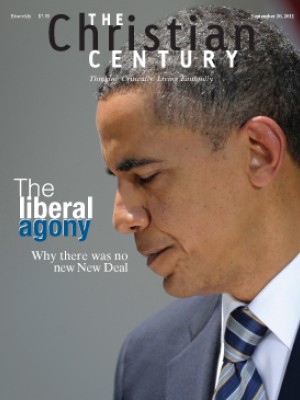Nearly 2,000 conservatives in PCUSA ponder options for mission, separation
The biggest news from a recent gathering of Presbyterians in Minnesota in the aftermath of approval by the Presbyterian Church (U.S.A.) to ordain qualified clergy who are openly gay was the unexpectedly large turnout—almost 2,000 clergy and laity who say their denomination has increasingly abandoned scriptural standards.
The tradition-minded evangelicals, said to represent about 850 congregations, were asked by organizers not to make the meeting in Bloomington "a gripe session or a pep rally." Rather, they were urged to consider possible proposals, some hypothetical, for mission-focused units within the PCUSA that reject gay ordination or for stepping out as a new Reformed church body.
Read our latest issue or browse back issues.
"The world does not need another denomination, but continuing on the same path is a dead end and we're not going to do that anymore," said John Crosby, pastor of Christ Presbyterian Church near Minneapolis and an organizer of the August 24–26 gathering.
Crosby was alluding to announced plans for the next Fellowship of Presbyterians gathering January 12–14 in Orlando, Florida, that would establish a new Reformed body to receive congregations disenchanted with the Louisville, Kentucky-based PCUSA. The matter of whether such congregations would be permitted to keep their properties and reach other financial settlements with the PCUSA remains a major question.
Pastor Jim Singleton of First Presbyterian Church of Colorado Springs, Colorado, told attendees that the key issue is not simply the revision of the PCUSA's "fidelity in marriage, chastity in singleness" requirement for ordination but the amendment that calls for "joyful obedience to Jesus Christ" with no mention of sexual behavior.
The greatest complaint is "the erosion of the way we understand biblical authority. We're in a box canyon, and we're not sure how to move because it seems like a dead end, fracturing the church," said Singleton, according to Presbyterian News Service reports on the meeting.
Singleton and Crosby have been prime spokesmen for the seven-member steering committee of the Fellowship of Presbyterians which began to attract notice last winter. The committee has proposed that dissenting churches who want to stay within the 2-million-member PCUSA be allowed to form new presbyteries of "like-minded congregations" within existing presbyteries, or regional bodies.
A four-tier range of choices emerged at meeting's end. One acknowledges that many unhappy churches will prefer to work for changes within the PCUSA. Another suggests creating two theologically different commissions on ministry. "Repeat after me," Singleton told attendees. "It'll be messy."
One variation on the church-within-a-church theme was suggested at the meeting by Richard Mouw, president of Fuller Theological Seminary, who was invited to speak in a worship service and answer questions.
"Historically, when Catholics felt the church had gone astray, they didn't leave, they formed special orders who took special vows according to their commitments," said Mouw, as reported by Presbyterian News Service. "The commitment to theological orthodoxy for many of us should take the form of a special vow, to witness to the essential tenets and the power of the Reformed faith."





